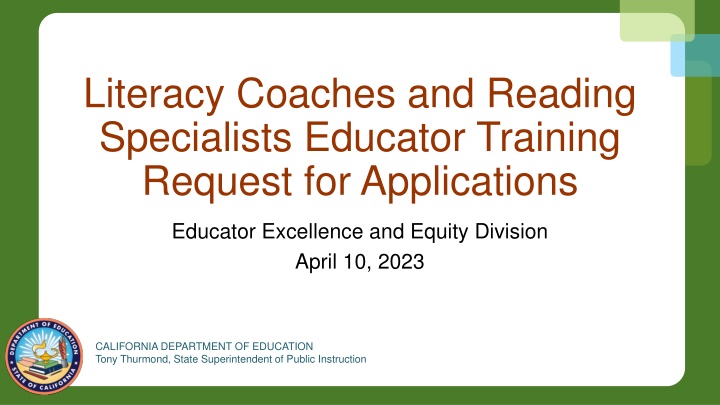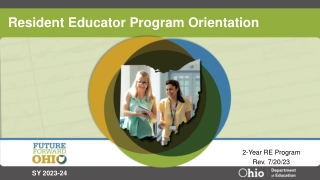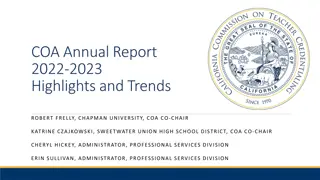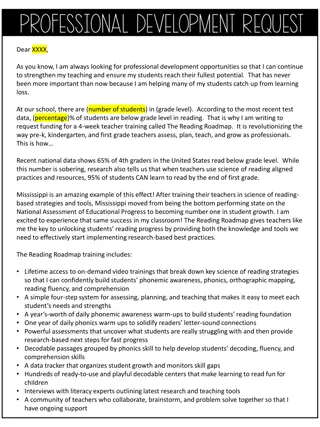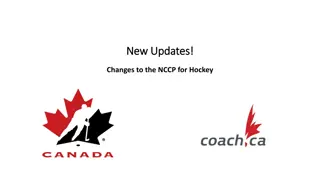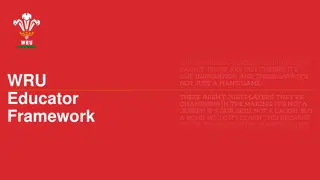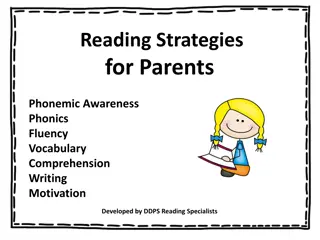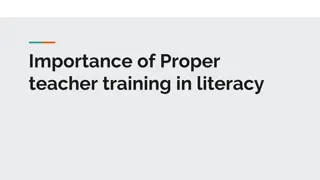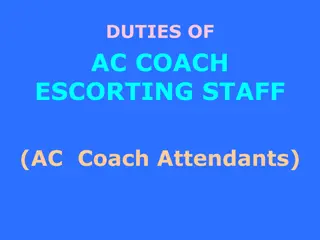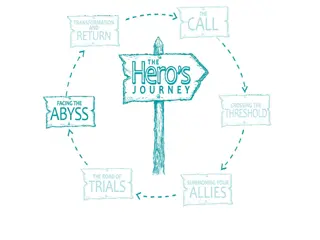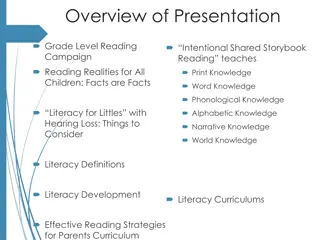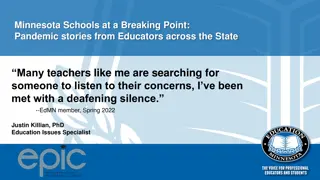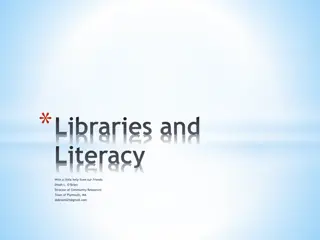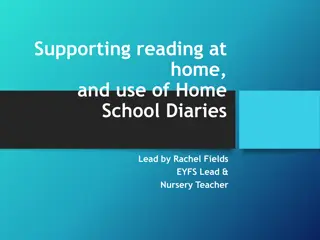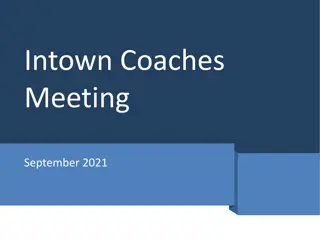Literacy Coaches and Reading Specialists Educator Training Request for Applications
California Department of Education announces a grant program offering $25 million for training educators to become literacy coaches and reading specialists. Applicants prioritized based on literacy improvement track record and partnerships with higher education institutions.
Download Presentation

Please find below an Image/Link to download the presentation.
The content on the website is provided AS IS for your information and personal use only. It may not be sold, licensed, or shared on other websites without obtaining consent from the author.If you encounter any issues during the download, it is possible that the publisher has removed the file from their server.
You are allowed to download the files provided on this website for personal or commercial use, subject to the condition that they are used lawfully. All files are the property of their respective owners.
The content on the website is provided AS IS for your information and personal use only. It may not be sold, licensed, or shared on other websites without obtaining consent from the author.
E N D
Presentation Transcript
Literacy Coaches and Reading Specialists Educator Training Request for Applications Educator Excellence and Equity Division April 10, 2023 CALIFORNIA DEPARTMENT OF EDUCATION Tony Thurmond, State Superintendent of Public Instruction
Housekeeping All webinar participants have been placed on mute. Please hold questions until the end. The slides will be available on the California Department of Education (CDE) Literacy Coaches and Reading Specialists Educator Training (LCRSET) Request for Application (RFA) web page at http://www.cde.ca.gov/fg/fo/r12/lcrs23rfa.asp 2
Welcome Jennifer Howerter, Education Programs Consultant Julia Agostinelli, Education Administrator Cheryl Cotton, Deputy Superintendent of Public Instruction Professional Learning Innovations Office Educator Excellence and Equity Division Instruction, Measurement & Administration Branch 3
Authorizing Statute (1) Assembly Bill (AB) 181, Section 137 (Chapter 52, Statutes of 2022) authorized $25 million to the LCRSET grant program. The State Superintendent of Public Instruction (SSPI), in consultation with the California Commission on Teacher Credentialing (Commission), and subject to the approval of the State Board of Education (SBE) will award the sum of $25 million to a county office of education (COE), or consortium of COEs, to develop and provide training for educators to become literacy coaches and reading and literacy specialists. 5
Authorizing Statute (2) The SSPI shall prioritize applicants with demonstrated success in improving literacy, especially among underperforming pupil subgroups, and who plan to partner with institutions of higher education (IHEs) with demonstrated success in providing statewide professional development (PD) for expert literacy practice. 6
Authorizing Statute (3) AB 181, Section 137 (Chapter 52, Statutes of 2022) also authorized $225 million as a direct allocation of funds to eligible sites within local educational agencies (LEAs) to develop school literacy programs, employ and train literacy coaches and reading and literacy specialists, and develop and implement interventions for pupils in need of targeted literacy support. These funds were issued to LEAs in January 2023. The LCRSET grantee will support the LEAs that received these funds. 7
Authorizing Statute (4) Funds appropriated for this purpose are available for encumbrance through June 30, 2027. The project period is from August 2023 to March 31, 2027. 8
Authorizing Statute (5) Note that LEAs that participate in activities offered by the grantee may also participate in the Reading and Literacy Supplementary Authorization Incentive Grant Program offered by the Commission. 9
Trailer Bill The 2023 24 Education Omnibus Trailer Bill has proposed an increase in funding for the LCRS program. Additional $250 million - $248 million allocated to additional eligible LEAs - $2 million to the chosen grantee to support these additional LEAs and contract with an external evaluator 10
Grant Funding and Duration One Lead Applicant One grant of $25 million Grant period: August 2023 through March 31, 2027 Deadline for Applications: May 26, 2023, before 4 p.m. 11
Grant Eligibility (1) County Offices of Education The CDE shall allocate grant funding to a COE. Consortia Priority and points will be given to applicants working in consortium with an IHE with demonstrated success in providing statewide PD for expert literacy practice. Consortia with other COEs is allowed. One COE must be identified as the Lead Applicant. 13
Partnerships and Consortia (1) The CDE shall prioritize and award points to applicants that propose partnerships with an IHE, or a consortium of IHEs, that has demonstrated success in providing statewide PD for expert literacy practice. The Lead Applicant is encouraged to work with IHEs, especially those that partner with the California Reading and Literature Project, that can support educators in obtaining the reading and literacy added authorization and/or specialist credential accredited by the Commission. 14
Partnerships and Consortia (2) COEs may also partner as a consortium with other COEs in the development of the proposal and throughout the duration of the grant period. If a consortium of COEs submits an application, one COE must be identified as the Lead Applicant. 15
Grant Eligibility (2) Ability and Capacity Demonstrated success in improving literacy, especially among underperforming pupil subgroups, including: - Developing school literacy programs - Preparing and providing professional learning (PL) for literacy coaches and reading specialists - Implementing evidence-based literacy instruction and interventions, including implementation of dual language acquisition and English Language Development (ELD) programs, culturally sustaining curriculum and instruction, the use of data to support effective instruction, the use of data to identify and support struggling pupils, and the English Language Arts (ELA)/ELD Framework - Implementing evidence-based family literacy initiatives 16
Grant Eligibility (3) Additionally, all aspects of this project must be rooted in evidence-based practices. Applicants will be required to cite their evidence and provide a works cited page. 17
Definition: Evidence-Based Practices Evidence-Based Practices An activity, strategy, or intervention that demonstrates a statistically significant effect on improving student outcomes or other relevant outcomes based on evidence. 18
Resources: Evidence-Based Practices The National Center on Intensive Intervention at the American Institutes for Research https://charts.intensiveintervention.org/aintervention The U.S. Department of Education s What Works Clearinghouse https://ies.ed.gov/ncee/wwc/FWW 19
Alignment 20
Alignment to Literacy Guidance and State Initiatives The work of the LCRSET grant program will align with: The ELA/ELD Framework Literacy Standards and Teaching Performance Expectations (TPEs) The California Comprehensive State Literacy Plan (SLP) Multi-Tiered Systems of Support (MTSS) The Quality Professional Learning Standards (QPLS) Statewide Literacy Initiatives 21
The English Language Arts / English Language Development Framework PL through the LCRSET grant program should be aligned to the ELA/ELD Framework, including the five key themes of: meaning making; language development; effective expression; content knowledge; and foundational skills. 22
Literacy Standards and Teaching Performance Expectations Adopted by the Commission in October 2022, the Literacy Standards and TPEs encompass the study of effective means of teaching literacy across all disciplines. They are rooted in the ELA and Literacy Standards, the ELD standards, and ELA/ELD Framework. The TPEs are grounded in Universal Design for Learning and asset- based pedagogies and also incorporate elements of the California Comprehensive SLP. 23
California Comprehensive State Literacy Plan (1) The California Comprehensive SLP, which was adopted by the SBE in March 2021, serves as a primary resource document for the grantee. The SLP is a foundational document designed to align and integrate state literacy initiatives, content standards, and guidance documents to build local capacity to effectively address student literacy needs. 24
California Comprehensive State Literacy Plan (2) The SLP provides a Comprehensive and Integrated Literacy Model designed to set the direction for literacy programs statewide. This inclusive and equitable system of supports for all students requires: a focus on family and community engagement; celebration of diversity and an asset-based approach; attention to whole child needs; and well-prepared and supported teachers and leaders. 25
Multi-Tiered System of Support (1) The MTSS is an integrated, comprehensive framework that focuses on the California Common Core State Standards (CCSS), core instruction, differentiated learning, student- centered learning, individualized student needs, and the alignment of systems necessary for all students academic, behavioral, and social success. 26
Multi-Tiered System of Support (2) PL through the LCRSET grant program should be aligned to the following CDE resources that support literacy in strong MTSS first instruction (Tier 1): The California CCSS for ELA/Literacy The California ELD Standards The California Dyslexia Guidelines Improving Education for Multilingual and English Learner (EL) Students The California Practitioners Guide for Educating ELs with Disabilities 27
Family Engagement Families are integral to student literacy development and achievement. The California Family Engagement Framework and accompanying toolkit provide direction for the grantee in working with families and communities to plan, implement, and evaluate family engagement practices. 28
Culturally Sustaining Pedagogy Culturally sustaining pedagogies require educators to be aware of classroom materials, structure, and culture to ensure a safe and relevant learning environment. The guidance documents, the CDE s EL Roadmap and Improving Education for Multilingual and EL Students, provide insight on supporting multilingual students in a culturally sustaining way. 29
Quality Professional Learning Standards Rooted in student and educator needs demonstrated through data; Focused on content and pedagogy; Designed to ensure equitable outcomes; Designed and structured to be ongoing, intensive, and embedded in practice; Collaborative with an emphasis on shared accountability; Supported by adequate resources; and Coherent and aligned with other standards, policies, and programs. 30
Data-Informed Interventions PL through the LCRSET grant must prepare teachers to effectively collect, analyze, and respond to student performance data. LEAs should be prepared to implement a full range of assessment cycles, including the use of formative assessments. In response to the data, a structured MTSS should be in place with clearly defined evidence-based Tier II interventions and Tier III systems for intensifying interventions with data-based individualization. 31
Alignment to State Literacy Initiatives (1) In the fall of 2021, the SSPI, Tony Thurmond, announced a campaign to ensure that every California student will learn to read by third grade by the year 2026. The effort also includes a biliteracy milestone for dual- language learners. Achievement of this vision requires the alignment of literacy initiatives and guidance across the state. The LCRSET grant will be key to reaching this goal. 32
Alignment to State Literacy Initiatives (2) The California Subject Matter Projects (CSMP) Grantees of the 21st Century California School Leadership Academy Grantees of the Comprehensive Literacy State Development Grant Grantees of the Educator Workforce Investment Grant (EWIG) for EL Roadmap Policy implementation Grantees of the EWIG Special Education Grant The California Dyslexia Initiative Grantee of the Reading Instruction and Intervention Grant 33
Program Requirements: Leadership The grantee will work closely with the CDE, the chosen evaluator, and any project partners over the course of this grant. The grantee will participate on an advisory committee composed of COE and CDE staff and led by the CDE, in monthly virtual meetings to review current and upcoming grant activities. All grant activities will be subject to prior approval by the CDE. 35
Program Requirements: Development (1) The grantee will create a solid foundation for this project, ensuring that it is well-rounded and informed by practitioners in the field, by using grant funds to inform the training and PL for literacy coaches with an in-person convening of literacy coaches from across the state. The grantee will solicit participation from these literacy coaches, gather and implement feedback from the convening participants, and ensure that any materials or resources developed as a result are aligned with California guidance, policy, and frameworks. 36
Program Requirements: Development (2) The grantee will provide opportunities for educators interested in receiving the required added authorization and/or credential for becoming a reading specialist, as well as use the class curriculum for becoming a reading specialist to inform the PL for literacy coaches. A grantee who proposes partnership with an IHE or consortium of IHEs should work with them to perform this task. 37
Program Requirements: Collaboration and Communication (1) The grantee will: Meet monthly with the advisory committee to review work and collaborate on next steps. Collaborate with and facilitate meetings among the LEAs across the state that received Literacy Coaches and Reading Specialists (LCRS) funds, as well as any partner agencies, such as IHEs, CSMPs, other COEs, other literacy initiatives, etc. Use these partnerships to host several events, including, but not limited to, statewide panel discussions and literacy summits. 38
Program Requirements: Collaboration and Communication (2) A critical aspect of the grantee s work will be to incentivize LEAs that receive LCRS funds to participate in the activities led by the grantee. This includes: Hosting communities of practice on a quarterly basis and in response to LEA needs, such as communities of practice focusing on the needs of rural LEAs as well as local PL events in the northern, central, and southern regions of the state. Providing opportunities for the LEAs to share their work with each other and gather feedback from the LEAs to inform offered PL and resources. 39
Program Requirements: Collaboration and Communication (3) The grantee will also provide regular communications on grant work to update all educational partners on their activities. This will include: Media releases Newsletters Conference presentations Presentations to the SSPI s Literacy and Biliteracy Task Force Regular work with the selected evaluator to review data collected and discuss best practices for dissemination 40
Program Requirements: Alignment (1) The grantee will support each element of the LCRS allocation for LEAs with evidence-based strategies that align with state guidance, policy, and frameworks. PL should also align with the Commission s Literacy TPEs, and standards for literacy instruction in the state s teacher education programs to inform the PL for both LCRS. 41
Program Requirements: Alignment (2) For more information on the Commission s added authorization and specialist credential: Reading and Literacy Added Authorization (CL-812) Reading and Literacy Leadership Specialist Credential (CL-537) 42
Program Requirements: Implementation and Expansion (1) The grantee will: Develop and disseminate PL and support, resources, and training materials across the state to all sites that have received the allocation, differentiated PL and support to meet the needs of the local context. Incentivize all LEAs that receive LCRS funds to participate in the PL and adopt the resources developed through this grant program. 43
Program Requirements: Implementation and Expansion (2) Expand upon existing structures to ensure resources created through the grant are available free of charge after the grant s completion. Support teachers with PL on providing best first instruction, along with collaboratively collecting and analyzing student data, making instructional adjustments, identifying students needing interventions and providing those interventions promptly, and monitoring ongoing student progress. 44
Program Requirements: Implementation and Expansion (3) Ensure PL opportunities are provided to urban, suburban, and rural settings throughout the state and are differentiated to meet the needs of local communities and diverse student populations. 45
Program Requirements: Evaluation (1) The grantee will be required, in consultation with and subject to the approval of the SBE and the SSPI, to contract with an independent evaluator. The grantee must commit to engaging in a request for proposals process after receiving the grant award to select an independent evaluator. 46
Program Requirements: Evaluation (2) The evaluation will include, but is not limited to, the following: How funds were used to employ literacy coaches and reading and literacy specialists How funds were used to develop and implement school literacy programs, including assessment and ongoing monitoring of student performance, provision of needed interventions, and coaching of classroom teachers How expenditures impacted pupils literacy achievement, including for pupil groups 47
Program Requirements: Evaluation (3) How the LEAs plan to continue to fund literacy coaches and reading and literacy specialists past the award period How the offerings developed and provided by the grantee impacted the preparation and PL of literacy coaches and reading and literacy specialists, including but not limited to the literacy knowledge and leadership skills 48
Program Requirements: Evaluation (4) To support the evaluation, the grantee will: Collect and monitor data to ensure PL project goals are being met, including meeting the overarching SSPI goal of students reading by third grade. Directly impact classroom instruction that results in improved student outcomes, disaggregated by student group, and will impact the knowledge and skills of participating coaches, specialists, and classroom teachers. Collect data on all community literacy events. Review grantee and LEA activities and work with the CDE and the evaluator to develop interim and final reports. 49
Goals (1) The grantee will: Support PL project goals as well as achieving the goal of California students reading by third grade by 2026 by working with the CDE to build the capacity of LEAs receiving LCRS funds. Align all PL offerings to the TPEs, the ELA/ELD Framework, the SLP, the California CCSS for ELA/Literacy, the California ELD Standards, and the QPLS. 50
